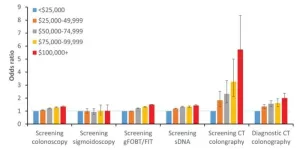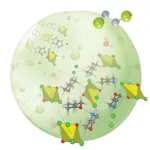(Press-News.org) Private equity ownership of healthcare services such as nursing homes and hospitals is associated with harmful impacts on costs and quality of care, suggests a review of the latest evidence published by The BMJ today.
No consistently beneficial impacts of private equity ownership were identified, and the researchers say these results confirm the need for more research on private equity ownership in healthcare and possibly increased regulation.
Private equity firms use capital from wealthy individuals and large institutional investors to buy companies, and, after a relatively brief period of ownership, sell them for substantial returns. Over the past decade, private equity firms have increasingly invested in, acquired, and consolidated healthcare facilities, with global healthcare buyouts exceeding $200bn (£157bn; €184bn) since 2021 alone.
But despite much speculation, it’s still not clear what impact private equity ownership of healthcare operators has on costs, quality of care, and health outcomes.
To address this uncertainty, researchers analysed the results of 55 studies (47 focused exclusively on the US) published in peer reviewed journals in the past two decades.
Nursing homes were the most commonly studied settings, followed by hospitals and dermatology facilities. The studies were designed differently, and were of varying quality, but the researchers were able to allow for that in their analysis.
Nine of 12 studies showed higher costs to patients or payers at health facilities owned by private equity firms (harmful impact), three found no differences, and none showed lower costs (beneficial impact).
Private equity ownership was also associated with mixed to harmful impacts on quality. Of 27 studies that assessed healthcare quality, 12 found harmful impacts, three found beneficial impacts, nine found mixed impacts (some quality measures declined, some improved), and in three the results were neutral.
Health outcomes showed both beneficial and harmful results, as did costs to operators, but the volume of studies for these outcomes was too low for any definitive conclusions to be drawn.
When nursing homes were analysed separately, private equity ownership often had mixed impacts on quality, but the researchers point out that more evidence suggests a degradation rather than an improvement in quality, such as a decrease in nurse staffing or a shift to lower nursing skill mix.
The researchers acknowledge that they did not differentiate between different types of private equity investment and ownership, and were unable to assess larger possible impacts of private equity on access to care. And because most of the included studies occurred in the US, the impacts identified may not apply to all global settings.
Nevertheless, they say this study fills a gap in the current literature on private equity ownership in healthcare, and presents emergent patterns related to private equity ownership that other studies have been unable to synthesise.
As such, they say: “The results of this study confirm the need for increased rigorous research on private equity ownership in healthcare, particularly its impacts on health outcomes and system costs and in other non-US settings, such as Europe.”
“This said, the current body of evidence is robust enough to confirm that private equity ownership is a consequential and increasingly prominent element in healthcare, warranting surveillance, reporting, and possibly increased regulation.”
“Unfortunately, it is much harder to identify legislative solutions to quality problems at provider organisations owned by private equity firms,” says journalist Merrill Goozner, in a linked editorial.
He acknowledges that a few US states “have begun contemplating closer scrutiny of proposed private equity acquisitions” but says public officials “clearly need new and more effective tools for reviewing and approving the terms of private equity’s involvement in healthcare.”
The best time to stop the deterioration in healthcare quality associated with takeovers is before it starts, he writes. “Higher quality studies on patient safety and outcomes and the effect of private equity takeovers on communities would greatly bolster the case for legislators proposing stricter regulations.”
[Ends]
END
Private equity takeovers of healthcare services linked to patient harm
Review suggests that costs tend to rise and quality falls at acquired healthcare providers
2023-07-20
ELSE PRESS RELEASES FROM THIS DATE:
Disrupted access to healthcare during pandemic linked to avoidable hospital admissions
2023-07-20
People who experienced disrupted access to healthcare (including appointments and procedures) during the covid-19 pandemic were more likely to have potentially preventable hospital admissions, finds a study published by The BMJ today.
This is the first study to examine the impact of disruption on health outcomes using individual level longitudinal data, and the researchers say reducing the backlog from covid-19 disruption is vital to tackle the short and long term implications of the pandemic.
The ...
Exposure to antiseizure medications does not harm neurological development in young children
2023-07-20
PITTSBURGH, July 19, 2023 — Most mothers who took prescription antiseizure medications during pregnancy can breathe a sigh of relief: A new study published today in Lancet Neurology found that young children who were exposed to commonly-prescribed medications in utero do not have worse neurodevelopmental outcomes than children of healthy women.
Commonly used antiseizure medications such as lamotrigine and levetiracetam are generally considered effective and safe, especially compared to many first-generation epilepsy treatments that carried profound risks to the unborn child. ...
AJR on sociodemographic factors and screening CTC among Medicare beneficiaries
2023-07-20
Leesburg, VA, July 19, 2023—According to an accepted manuscript published in the American Journal of Roentgenology (AJR), lacking Medicare coverage could contribute to greater income-based differences in use of screening CT colonography (CTC) than of other recommended screening strategies or of diagnostic CTC.
Noting that Medicare’s non-coverage for screening CTC may account for lower adherence with screening guidelines among lower-income beneficiaries, “Medicare coverage of CTC could reduce income-based disparities for individuals avoiding optical colonoscopy due to invasiveness, need for anesthesia, or complication ...
Study sheds light on cellular interactions that lead to liver transplant survival
2023-07-20
A new study identifies how certain proteins in the immune system interact leading to organ rejection. The study, which involved experiments on mice and human patients, uncovered an important communication pathway between two molecules called CEACAM1 (CC1) and TIM-3, finding that the pathway plays a crucial role in controlling the body's immune response during liver transplantation.
When an organ is transplanted from a donor to a recipient, the recipient's immune system recognizes the transplanted tissue as foreign, activating an immune response that can lead to rejection. T cells play a significant role ...
A potential new biomarker for Alzheimer’s
2023-07-20
Alzheimer’s is considered a disease of old age, with most people being diagnosed after 65. But the condition actually begins developing out of sight many years before any symptoms emerge. Tiny proteins, known as amyloid-beta peptides, clump together in the brain to form plaques. These plaques lead to inflammation and eventually cause neuronal cell death.
Interplay of proteins in the brain reveals disease mechanism
Exactly what triggers these pathological changes is still unclear. “We’re lacking good diagnostic markers that would allow us to reliably detect the disease at an early stage or make predictions about its course,” says Professor ...
A non-covalent bonding experience
2023-07-19
UPTON, NY—Putting a suite of new materials synthesis and characterization methods to the test, a team of scientists from the University of Iowa and the U.S. Department of Energy's (DOE) Brookhaven National Laboratory has developed 14 organic-inorganic hybrid materials, seven of which are entirely new. These uranium-based materials, as well as the detailed report of their bonding mechanisms, will help advance clean energy solutions, including safe nuclear energy. The work, currently published online, was recognized as both a Very Important Paper and a Hot Topic: Crystal Engineering in ...
Research analyzes kidney functions and predictors of disease
2023-07-19
Research is shedding light on kidneys, their critical functions, and predictors of disease.
The research co-led by Matthias Kretzler, M.D. describes the creation of a cellular atlas of the kidney describing nearly 100 cell types and states. It represents the most comprehensive study of cellular states, neighborhoods, and outcome-associated signatures in the kidney.
Researchers from more than twenty institutions collaborated on this project.
Kidneys monitor and maintain the internal balance in the body, filter out ...
SARS-CoV-2 infects liver, stimulating glucose production and contributing to severe form of COVID-19
2023-07-19
Research conducted at the University of São Paulo (USP) in Brazil shows that SARS-CoV-2, the virus that causes COVID-19, can infect liver cells (hepatocytes), stimulating glucose production and leading to a condition similar to diabetes (hyperglycemia) in hospitalized patients, even if their blood sugar level was normal before they were admitted to hospital.
An article on the study is published in Proceedings of the National Academy of Sciences (PNAS). The findings describe part of the mechanism used by the virus to infect liver cells and impair glucose metabolism, and point ...
Research could pave way to greener, more sustainable products made with renewable carbon
2023-07-19
Carbon-based materials have several qualities that make them attractive as catalysts for speeding up chemical reactions. They are low-cost, lightweight and their high surface area provides a good scaffold on which to anchor catalysts, keeping them stable and dispersed far apart, while providing molecules a lot of surface area to work. This makes carbons useful for energy storage and sensors. Over the last 10 years, carbons have been used in electrochemistry to catalyze reactions to make chemicals and fuel cells.
However, ...
Unlocking the power of molecular crystals: a possible solution to nuclear waste
2023-07-19
In a world increasingly concerned about the environmental and geopolitical implications of fossil fuel usage, nuclear energy has resurfaced as a subject of great interest. Its ability to generate electricity at scale without greenhouse gas emissions holds promise as a sustainable clean energy source that could bridge society’s transition away from fossil fuels to a net-zero future. However, nuclear power generation does produce radioactive waste. The safe management of nuclear waste remains a crucial challenge that must be addressed to gain public confidence in this transformative power solution.
Now, a team of University of Houston researchers has come up with an innovative ...
LAST 30 PRESS RELEASES:
New study finds earliest evidence of big land predators hunting plant-eaters
Newer groundwater associated with higher risk of Parkinson’s disease
New study identifies growth hormone receptor as possible target to improve lung cancer treatment
Routine helps children adjust to school, but harsh parenting may undo benefits
IEEE honors Pitt’s Fang Peng with medal in power engineering
SwRI and the NPSS Consortium release new version of NPSS® software with improved functionality
Study identifies molecular cause of taste loss after COVID
Accounting for soil saturation enhances atmospheric river flood warnings
The research that got sick veterans treatment
Study finds that on-demand wage access boosts savings and financial engagement for low-wage workers
Antarctica has lost 10 times the size of Greater Los Angeles in ice over 30 years
Scared of spiders? The real horror story is a world without them
New study moves nanomedicine one step closer to better and safer drug delivery
Illinois team tests the costs, benefits of agrivoltaics across the Midwest
Highly stable self-rectifying memristor arrays: Enabling reliable neuromorphic computing via multi-state regulation
Composite superionic electrolytes for pressure-less solid-state batteries achieved by continuously perpendicularly aligned 2D pathways
Exploring why some people may prefer alcohol over other rewards
How expectations about artificial sweeteners may affect their taste
Ultrasound AI receives FDA De Novo clearance for delivery date AI technology
Amino acid residue-driven nanoparticle targeting of protein cavities beyond size complementarity
New AI algorithm enables scientific monitoring of "blue tears"
Insufficient sleep among US adolescents across behavioral risk groups
Long COVID and recovery among US adults
Trends in poverty and birth outcomes in the US
Heterogeneity of treatment effects of GLP-1 RAs for weight loss in adults
Within-person association between daily screen use and sleep in youth
Low-dose lithium for mild cognitive impairment
Catheter ablation and oral anticoagulation for secondary stroke prevention in atrial fibrillation
A new theory of brain development
Pilot clinical trial suggests low dose lithium may slow verbal memory decline
[Press-News.org] Private equity takeovers of healthcare services linked to patient harmReview suggests that costs tend to rise and quality falls at acquired healthcare providers



